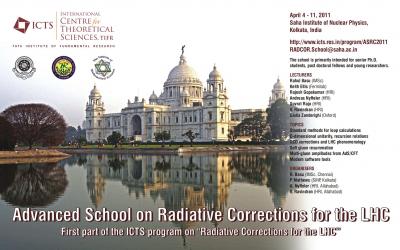The program RADIATIVE CORRECTIONS FOR THE LHC has been organized in two parts:
1. Advanced School on Radiative Corrections for the LHC, April 04 -11, 2011, Saha Institute of Nuclear Physics, Kolkata
2. RADCOR 2011 - 10th International Symposium on Radiative Corrections, September 26-30, 2011, Mahabalipuram
The era of the Large Hadron Collider (LHC) at CERN, Geneva has begun. While the LHC detectors will be able to measure fundamental scattering reactions with unprecedented experimental precision, it is clear that the interpretation of these high-quality data demands an equally high precision in the theoretical predictions. In order to connect the observed phenomena with the underlying theoretical models, one needs a precise understanding of the involved processes at the quantum level. Since the Standard Model and most theories of New Physics are quantum field theories, one has to reliably calculate processes with many external particles and also include loop corrections from strong and electroweak interactions and from within the New Physics scenarios.
The main objective of the program is to develop expertise in India in the field of radiative corrections which is at the forefront of current international research, by getting young researchers from India interested in the subject. We will organise the program in two parts, the first part being a preparatory "Advanced School on Radiative Corrections for the LHC'' in April 2011, with about 20 senior Ph.D. students and young postdoctoral fellows from India as the target audience.
The topics that will be covered in pedagogical lectures at the Advanced School are:
- standard methods to perform higher order loop calculations
- advanced state-of-the-art methods which have been developed recently
- like D-dimensional unitarity and recursion relations
- string theory methods to calculate multi-gluon scattering amplitudes using the AdS/CFT correspondence
- modern software tools which allow one to tackle realistic applications with many complicated Feynman diagrams
- The tutorials will contain hands-on computer sessions to introduce the students to some of the software packages which are now available
The students and postdoctoral fellows who have attended the Advanced School are encouraged to register for the "10th International Symposium on Radiative Corrections (RADCOR 2011)'' which will take place in September 2011. This meeting will take stock of the recent developments in the application of quantum fieldtheory to particle physics phenomenology and experts in the field from all over the world will present their latest results. In particular, theoretical studies of the radiative corrections of the Standard Model and of its extensions will be discussed and compared with available experimental data from the Tevatron at Fermilab and, by then, the LHC. By September 2011, the LHC will have collected a large amount of data to test various predictions for processes in the Standard Model. This will help improve the Monte-Carlo tools used by experimentalists and theorists and will likely also point to issues which need further theoretical work. All of these will be discussed in detail at RADCOR 2011 and therefore the meeting will be crucial for future developments concerning LHC physics.
This Advanced School is the first part of the ICTS program on RADIATIVE CORRECTIONS FOR THE LHC.
The second part will consist of a symposium: RADCOR 2011
The era of the Large Hadron Collider (LHC) at CERN has begun. While the LHC detectors will be able to measure fundamental scattering reactions with unprecedented experimental precision, the interpretation of these high-quality data demands an equally high precision in the theoretical predictions. In order to connect the observed phenomena with the underlying theoretical models, a precise understanding of the involved processes at the quantum level is essential. The main objective of the Advanced School is to develop expertise in the field of radiative corrections which is at the forefront of current research.
Topics:
- Standard methods for loop calculations
- D-dimensional unitarity and recursion relations
- QCD corrections and LHC phenomenology
- Soft gluon resummation
- Multi-gluon amplitudes from AdS/CFT
- Modern software tools
Lecturers:
- Keith Ellis (Fermilab) (4 lectures)
- Rikkert Frederix (Uni.Zurich) (4 lectures)
- Rajesh Gopakumar (HRI) (2 lectures)
- Anuradha Misra (MU) (2 lectures)
- Andreas Nyffeler (HRI) (2 lectures)
- Suvrat Raju (HRI) (2 lectures)
- V. Ravindran (HRI) (2 lectures)
There will also be tutorials and computer hands-on sessions. The target audience for the school are senior Ph.D. students, post-doctoral fellows and young researchers. It is assumed that the partipcipants have already attended courses on Quantum Field Theory and Particle Physics. Local hospitality and travel allowance will be provided as per rule to all participants.
The students and postdoctoral fellows who have attended the Advanced School are encouraged to register for the "10th International Symposium on Radiative Corrections (RADCOR 2011)'' which will take place in September 2011. RADCOR 2011 will take stock of the recent developments in the application of quantum field theory to particle physics phenomenology and experts in the field from all over the world will present their latest results.
Registration of participants for this program has been closed
 School
School  saha
saha ac
ac in
in

